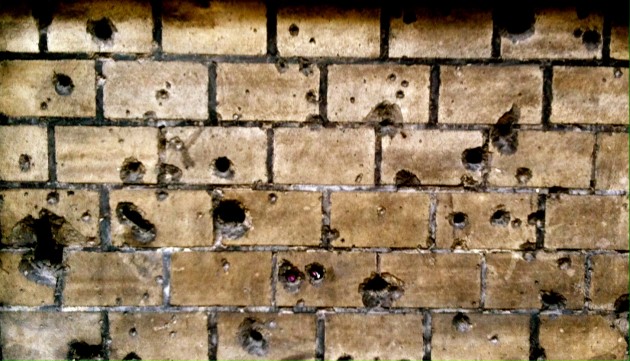The Soviets, actually, aimed at conquering Poland, rather than liberating it, and stood by on the other bank of the river. Nor they allowed the Britons to use their air bases nearby. Nor the Britons, truthfully, insisted too much, because they were already focused on the aftermath, on a new international order: and they needed Stalin. He was – he was the lesser evil.

I walk around Warsaw, and I am in Aleppo. During the Second World War, 85 percent of the city was destroyed. But most of all, on August 1, 1944, the Poles, under Nazi occupation since five years, started an uprising that in 63 days mowed down 200,000 civilians. More than 3,000 per day. More than a hundred per hour, two every minute. It’s here Aleppo, in these streets where there’s no Pole who doesn’t point out to you a corner where a father, a friend died, there’s no corner which isn’t a grave – here, among these old walls pierced by bullets: and also, simply because the weapons on diplay at the Uprising Museum, wood handle rifles, makeshift mortars, rusty rockets, are the same weapons used by Syrian rebels a century on, flip-flops, a T-shirt, and a tuna can turned into a hand grenade. The executions, the hunger the epidemics, the rows of crosses in the gardens, these dusty heads nested into the rubble, it’s here Aleppo, in every photo. And most of all, in the belief that the Allies would have come to the rescue.
That they would have crossed the river.
Because the Allies were there. A few metres away.
The Germans went on bombing also after the city’s surrender. For Hitler, Warsaw hadn’t strategic value: it had warning value. He wanted it razed to the ground.
Be everybody aware of what happens to those who dare to oppose, to stand in the regime’s way. Everybody. In Berlin, in Rome. In Amsterdam.
In Homs and Damascus.
Wars are strange. They are so diverse, and yet they all look the same.
The left-wing press, sided with the Soviets, claimed that the insurgents didn’t genuinely represent the local population. That they were led from the outside. And the Poles were left alone. “And now that they are fighting against Hitler, now that they have done what you have been asking them to do, you don’t support them,” George Orwell wrote. And you say thousand things, just not to say, simply, that you are with Stalin.
The cowardice, the dishonesty of these years, he wrote, will mark you for life.
A century on, Warsaw has been rebuilt brick by brick. Just like before. And it has this peaceful, quiet air now, huddled up: it’s beautiful, with this central square, the cafés, the cobblestones, the old, small shops, and all the tourists who look at the windows, the emblems, the mural paintings, flawless, the cast iron lanterns, everything that is exactly like before, and – and you look at the colors, instead. When a friend says: Some day you’ll walk around Aleppo as now you walk around Warsaw: he says: Wars don’t last forever – and you look at the plasters instead: this yellow, this green, this blue without a crack, so perfect: so new: so ageless, timeless, with no past, you can’t but notice it, you who comes from the rubble, you who know that there’s no return: you can’t but notice it, feel it, in the streets, this life that you lost, and that nobody will be ever able to rebuild, in this city now, so beautiful, and so fragile, this city that there’s no way: it’s now a different city. And it’s not the city where you are, while your friends talk to you, they buy a hat, a shell, amber cuff links: they live, and you, instead, you are elsewhere – because wars are strange, and fierce: they don’t last forever: but they never end.
And they chase you, they hunt you, now that no matter how perfectly rebuilt it will be, no street will ever take to you, to your life anymore. Now that you come across a guy just like Jim, he is tall, thin, with those Ray-Ban aviator, and instinctively you stop: instinctively you are about to greet him, while you walk around this park, and there is a swing, a yellow swing, just like the one in Bustan al-Qasr, the one that dangles on a mass grave, on the slightly rough grass, and stuck in the topsoil, there’s a merry-go-round, a severed arm – and you turn your head, instinctively, because there’s a sniper, on the right, in the TV tower, while at dinner, tonight, a trio plays the same music of a dinner with Kasim, a squeezebox, a violin, a violoncello, and in a window, there’s on sale the same toy that Abdelkader gave to a kid, in a rainy morning, a wooden toy, it has the same colors, like this tea is the same green tea of your last time with Abu Maryam, while you walk, you walk around Warsaw, and you know that some day, sure, this war will end, and you walk around Aleppo, and Aleppo will be beautiful, and nothing will blow up, it will be perfect, rebuilt brick by brick – in the end, that’s the first thing we told each other, with Abdallah: when it will be over: we’ll have grilled fish and white wine.
You’ll teach me how to drive a jeep, when it will be over.
And I’ll teach you how to drive a Vespa.
Because all this, no?, it can’t last forever.
Abdallah, Abdallah al-Yassin, was killed on March 2, 2013.
Abu Maryam was killed on April 16, 2014. Abdelkader al-Saleh on November 17, 2013, Kasim Haji Kasim on January 7, 2014. Jim Foley on August 9, 2014.
The only one who is still firmly alive, of my years in Syria, is Bashar al-Assad.
In this Syria that just by chance, now, is called Syria like the one where I have been living, this Syria where no street will ever take to me anymore.
Francesca’s new book, Syrian Dust, will be released in the US in September by Seven Stories Press
Articolo Precedente
Kirkuk – a photo

Articolo Successivo
Auschwitz Birkenau – A photo





